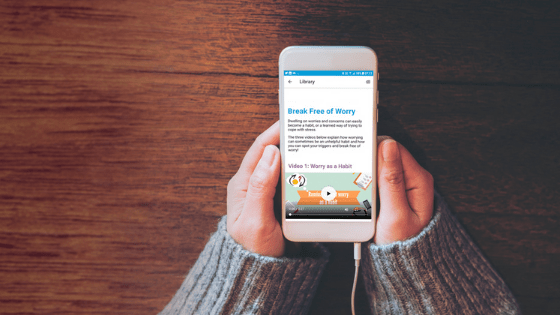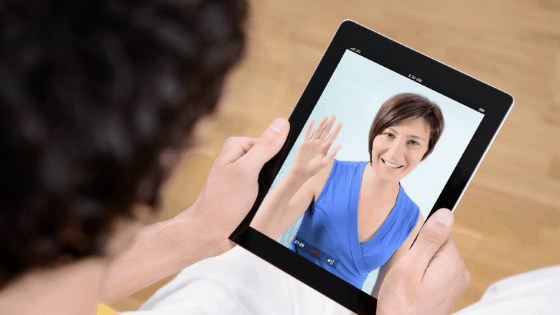In 2013, Danish authorities estimated that in Denmark, a country with 5.6 million people, patients with bipolar disorder and depression accounted for 20% of all psychiatric hospitalisations, which is the equivalent of more than 10,800 patients. The cost of these hospitalisations was estimated to be around 87 million Euros per year, which corresponds to 10,800 admissions with an average stay of 20 days at a cost of 400 Euros per day. The most effective treatment for both of these mental disorders includes medication and Cognitive Behavioural Therapy (CBT).
Smartphone-based CBT
The RADMIS research project, which was granted a budget of 1.3 million Euros by the Danish Innovation Fund, will be done in collaboration with the Mental Health Services of the Capital Region of Denmark (RHP) and the Danish Technical University (DTU).
The project aims to establish clinical evidence that the Monsenso mHealth solution can reduce the number of hospital readmissions of patients with depression and bipolar disorder by 50%. It also seeks to decrease the symptoms and improve the quality of life of outpatients with depression or bipolar disorder receiving smartphone-based CBT.
The multi-disciplinary team involved in the project is comprised of scientific researchers, psychiatrists, psychologists, and computer scientists. This group has already shown promising scientific results with the MONARCA research project.
The use of an intelligent, smartphone-based CBT for the monitoring and treatment for depression and bipolar disorders has never been tried before.
- The system combines automatic sensing and data collection with customisable self-assessment forms
- It provides advanced data analysis and forecasting of disease progression, allowing patient and treatment personnel day-to-day assessment, prediction and insight into causes of changes in health state
- It provides a platform for CBT treatment using innovative multi-media messages delivered ‘in-context’, tracking of medicine administration and compliance, as well as two-way communication between the patient and the clinic
Furthermore, smartphones have never been used in the research and collection of clinical evidence to reduce re-hospitalisation and improve treatment response among patients with depression and bipolar disorder.
After being discharged from the hospital, psychiatric patients undergo a high-risk period in which they are considered to have an increased risk of suicide of 300 times more during the first week and a high-risk of readmission. In fact, psychiatric patients are often afraid to leave the hospital, feeling alone and overwhelmed with the prospect of an appointment with a clinician in one or more months ahead.
A pilot study in Copenhagen involving 29 recently-discharged patients revealed the importance of continued contact with a care provider. In this study, patients used a daily computer system to self-monitor.
The study revealed that daily contact with a nurse using the bidirectional feedback system combined with a smartphone-based identifier of early-warning signs lowers the risk of relapse of depressive and (hypo-) manic symptoms. The pilot study also revealed that the incidence of suicide attempts and the rate of re-hospitalisation decreased.
The hypotheses to be investigated by the project
This project investigates two clinical questions related to the treatment of patients and one technical question related to online learning forecast systems:
- Can the risk and duration of psychiatric re-hospitalisation be reduced by using smartphone-based treatment?
- Can depressive and manic symptoms, psycho-social function, recovery, empowerment and quality of life be improved by using smartphone-based treatment?
- Can machine learning methodology, that runs on a smartphone app and adapts to data as it is collected, give users accurate forecasts and feedback on early warning signs of upcoming depression and hypomania/mania?
A bi-weekly workshop with 6-8 users will be conducted with a focus on the design of the features of the smartphone-based treatment system.
The questions will be investigated in two separate RCTs, focusing on the two patient groups (depressive and bipolar patients) with similar designs comparing the use of smartphone-based treatment with standard care. Each patient will be subject to the trial for six months. Recruitment, inclusion criteria and randomisation: 200 patients with recurrent depression and 200 patients with bipolar disorder at one of the five psychiatric centres in RHP. Patients aged 18 to 70 years will be screened with Schedules for Clinical Assessment in Neuropsychiatry (SCAN) to confirm the ICD-10 diagnosis.
Health outcomes:
Primary: Rate of re-hospitalisation and duration of hospitalisations.
Secondary: Severity of depression according to scores on the Hamilton Depression Rating Scale (36) and Young Mania Rating Scale (YMRS) (37) (for bipolar disorder patients only), at a given time point during the 6 month trial period. Functional assessment short test (FAST) (psychosocial function) (38).
Tertiary: Recovery Assessment Scale (39), empowerment according to Rogers empowerment scale (40), the WHO (Five) well-being index (41) and the Verona Satisfaction Scale-Affective Disorder (VSS-A) (42). Assessment of outcomes will be done by researchers blinded to allocation (single blinded).




